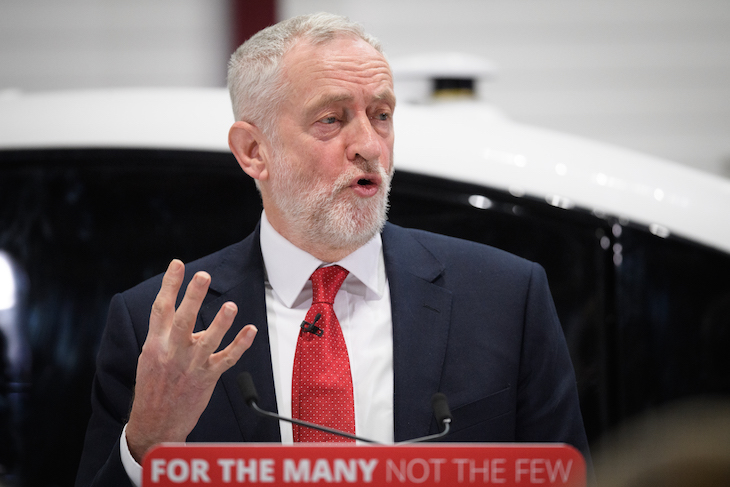Jeremy Corbyn wants Britain to ‘stay in a customs union’, according to the BBC. The phrase does not make sense. We could possibly stay in the customs union, if the EU decided to let us, but that is not the policy of his party or of the government. We cannot ‘stay’ in ‘a’ customs union, because that would require us to join something which does not at present exist. But the use of the reassuring word ‘stay’, in reference to an as yet unformed, unnegotiated customs union, is exactly the rhetorical sleight of hand which Mr Corbyn seeks. It is designed to persuade Remainer Conservative rebels that they must side with Labour in the forthcoming parliamentary vote. When they realise that Mr Corbyn is not supporting the customs union, but merely speculating about a customs union, they may decide that it would be strange to rebel in favour of a fantasy.
Mark Rowley, who is just stepping down as the country’s chief counterterrorism officer, is a classic British policeman of the best sort — a low-key, quietly amusing, naturally moderate professional who does not play political games. He became something of a hero (not a word he would endorse) for his cool handling of last year’s atrocities. On Monday night, he delivered the Cramphorn Memorial Lecture at Policy Exchange, firmly entrenching the understanding which the British authorities were too long loth to recognise, that extremism — even when not itself violent — is a necessary condition for Islamist violence to develop. On one point, however, I felt Mr Rowley did not convince. He warned, justifiably, that right-wing terrorism is on the rise. In doing so, however — perhaps in the interests of ‘balance’ — he set up an equivalence between Islamist terrorism and right-wing terrorism which does not exist, although morally there is little to choose between them. The non-equivalence is that the first is so very much more formidable, global, well financed and politically connected than the second. Where, in Britain, are the right-wing equivalent of extremist mosques, giving livelihoods to bad actors, often funded from abroad? Where are the suicide bombers and their mentors? And where are the powerful fellow travellers? In November, Mr Corbyn attended a parliamentary meeting organised by the extremist Muslim group MEND (which Mr Rowley says contributes to the ‘chronic threat’ we face). Also present was Chief Superintendent Dave Stringer, head of Community Engagement for the Met. It is unimaginable that Mr Corbyn (or any mainstream politician) or Mr Stringer would give their friendly blessing to a meeting run by Britain First or comparable right-wing corpuscle. The far right have no friends at court, thank goodness. The same cannot be said of the Islamists.
I had passed 60 years on the planet without seeing a work of Gilbert and Sullivan performed — until last week. Friends took us to the ENO’s Iolanthe at the Coliseum. Being so ignorant, I was in no position to enter purists’ discussions about whether the production was too silly and should not have depicted Boris Johnson en route. But it did seem to us that silliness is an admirable part of the original, starting with the idea of muddling up faeries and the Lord Chancellor (at a time when both entities had much higher standing than today). We had a very happy evening. As so often in English political life, the silliest things are the truest. The famous song about the House of Lords (‘When Britain really ruled the waves…’) makes the point that ‘The House of Peers made no pretence/ To intellectual eminence/ Or scholarship sublime;/ Yet Britain won her proudest bays/ In good Queen Bess’s glorious days…’. During the Napoleonic war, it did ‘nothing in particular/ and it did it very well’. There is a perpetual lesson: ‘And while the House of Peers withholds/ Its legislative hand,/ And noble statesmen do not itch/ To interfere with matters which/ They do not understand,/ As bright will shine Great Britain’s rays/ As in King George’s glorious days.’ This is simply, seriously true, and has been forgotten — with constitutionally damaging consequences.
I find the switch of the Guardian to tabloid format curiously upsetting. It makes me realise how good the paper was, and is now ceasing to be. It is not necessarily a mistake to go tabloid — the Times managed it well — but one has to recognise that form dictates content. If your size is smaller, your copy must be snappier. You must either — like the Daily Mail — rigorously impose your editorial priorities on every page, shouting your head off as you go, or — like the Times — cram a lot in, clearly and succinctly presented. What you must not do is to give the journalists their head to write just as they did when it was broadsheet (or Berliner). The Guardian has not asked its journalists to adapt, and so the thing now feels as slow-paced as a broadsheet, but without its authority. It looks like a student newspaper. It also feels more programmatically left-wing, as if there is literally no space left to take a wider view of the world.
There is a once-famous Osbert Lancaster cartoon of two railwaymen throwing up their hands in despair as white stuff descends on the platform and exclaiming, ‘Good Heavens! Snow in January.’ That wouldn’t happen now. Thanks to long-range forecasting, they can start cancelling the trains before any snow has fallen. (Yes, I realise it’s now March, but the point stands.)
As in past years, the editor has kindly let me advertise the Annual General Meeting of the Rectory Society in this column. It will take place in the chapel of the Royal Hospital, Chelsea, at 6 for 6.30 p.m. on Monday 12 March. The guest speaker will be Field Marshal Lord Guthrie. His talk is called ‘Confessions of a Christian Soldier’. Tickets can be obtained by emailing Alison Everington — ali@everington.net.
Got something to add? Join the discussion and comment below.
Get 10 issues for just $10
Subscribe to The Spectator Australia today for the next 10 magazine issues, plus full online access, for just $10.
You might disagree with half of it, but you’ll enjoy reading all of it. Try your first month for free, then just $2 a week for the remainder of your first year.















Comments
Don't miss out
Join the conversation with other Spectator Australia readers. Subscribe to leave a comment.
SUBSCRIBEAlready a subscriber? Log in